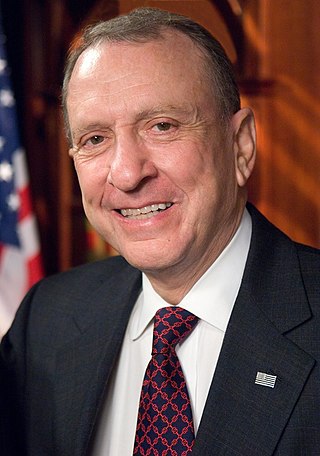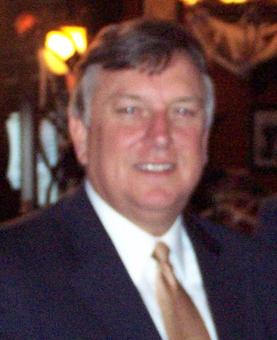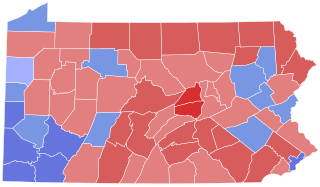
Arlen Specter was an American lawyer, author and politician who served as a United States Senator from Pennsylvania from 1981 to 2011. Specter was a Democrat from 1951 to 1965, then a Republican from 1965 until 2009, when he switched back to the Democratic Party. First elected in 1980, he was the longest-serving senator from Pennsylvania, having represented the state for 30 years.

The 1992 United States Senate elections, held November 3, 1992, were elections for the United States Senate. The 34 seats of Class 3 were contested in regular elections, along with special elections to fill vacancies. They coincided with Bill Clinton's victory in the presidential election. This was the first time since 1956 that the balance of the Senate remained the same.

The 2006 Pennsylvania gubernatorial election was held on November 7, 2006 and included the races for the Governor of Pennsylvania and Lieutenant Governor of Pennsylvania. Incumbent Democratic Governor Ed Rendell successfully ran for re-election. Pennsylvania's first female lieutenant governor, Catherine Baker Knoll, was also running for re-election.

Mark Stephen Singel is an American politician who served as the 27th lieutenant governor of Pennsylvania from 1987 to 1995, alongside Governor Bob Casey. Singel served as the state's acting governor from June 14, 1993 to December 13, 1993, during Casey's lengthy battle with amyloidosis and subsequent multiple organ transplant.

The 2006 United States Senate election in Pennsylvania was held on November 7, 2006. Incumbent Republican Rick Santorum ran for re-election to a third term, but was defeated by Democratic State Treasurer Bob Casey, Jr., the son of former Pennsylvania governor Bob Casey Sr. Casey was elected to serve between January 3, 2007 and January 3, 2013.

Pennsylvania is generally considered a swing state that leans slightly left. Throughout its entire history, it voted for the nationwide loser on only 10 occasions, meaning it has voted for the national winner 83% of the time as of 2020. Although, it generally supported Republicans between the Civil War and New Deal eras, as it voted Republican in every election between 1860 and 1932, except for 1912, when the Republican vote was split. Even then, the state's strong Republican ties meant that it backed Republican-turned-Progressive Theodore Roosevelt. The state backed a Democrat in 1936 for the first time since 1856. Pennsylvania generally leaned Democratic since the 1990s, as it backed the Democratic presidential candidate in every election since 1992 except in 2016, when it was won by Republican candidate Donald Trump with a plurality.

The 1991 United States Senate special election in Pennsylvania was held on November 5, 1991, after incumbent Republican Senator John Heinz died in a plane crash on April 4 of that year. Democrat Harris Wofford was appointed to the seat by Governor Bob Casey, and won the general election in a landslide over Republican Dick Thornburgh, a former Governor and U.S. Attorney General. Wofford became Pennsylvania's first Democratic Senator since Joseph S. Clark, Jr. left office in 1969. Major-party candidates for this election were chosen by party committees, as the vacancy had happened too late for a primary to be held.

The 2000 United States Senate election in Pennsylvania was held on November 7, 2000, during a year which coincided with a United States presidential election in which Pennsylvania was viewed as a swing state. Pennsylvania was one of four states that elected Republican Senators despite being won by Al Gore in the concurrent presidential election, the others being Maine, Rhode Island and Vermont.

The 2010 United States Senate election in Pennsylvania took place on November 2, 2010, during the 2010 midterm elections. Incumbent Republican-turned-Democrat U.S. Senator Arlen Specter ran for reelection to a sixth term, but lost in the Democratic primary to Joe Sestak. Republican nominee Pat Toomey then won the seat.

The 2004 United States Senate election in Pennsylvania was held on November 2, 2004. Incumbent Republican Senator Arlen Specter won re-election to a fifth term. As of 2024, this is the last time a Republican statewide candidate won Montgomery and Delaware Counties and won more than 25% of the vote in Philadelphia. Specter later lost renomination in 2010 as a Democrat, having joined the party in April 2009.

Electoral history of Arlen Specter, former United States Senator from Pennsylvania (1981–2011), Chairman of the Senate Committees on Intelligence (1995–1997), Veterans' Affairs and Judiciary (2005–2007), as well as a candidate for the 1996 Republican presidential nomination.

The 1994 Pennsylvania gubernatorial election was held on November 8, 1994. The incumbent governor, Bob Casey, Sr. (Democrat), was barred from seeking a third term by the state constitution. The Republican Party nominated Congressman Tom Ridge, while the Democrats nominated Mark Singel, Casey's lieutenant governor. Ridge went on to win the race with 45% of the vote. Singel finished with 39%, and Constitution Party candidate Peg Luksik finished third, garnering 12% of the vote.
Stephen F. Freind is a retired American politician from Pennsylvania who was a Republican member of the Pennsylvania House of Representatives for the 166th district from 1976 until 1993. He unsuccessfully challenged Arlen Specter in the 1992 Republican primary election. He authored the Abortion Control Act of 1982, a law that includes, with some exceptions, "requirements that a married woman notify her husband, that there be a 24-hour wait before any abortion, and that doctors show patients a pamphlet with pictures of developing fetuses", as well as another law to prevent suits against doctors for wrongful birth or wrongful life for not giving information about risk of fetal abnormalities. The Abortion Control Act was mostly upheld by the Supreme Court of the United States except for the spousal notification provision in the case of Planned Parenthood v. Casey.

The 1998 United States Senate election in Pennsylvania was held November 3, 1998. Incumbent Republican U.S. Senator Arlen Specter won re-election to a fourth term.

The 1978 Pennsylvania gubernatorial election was held on November 7, 1978. Incumbent Governor Milton Shapp was constitutionally ineligible to run for a third consecutive term in office. Republican Dick Thornburgh defeated Democrat Pete Flaherty in the general election.

The 1980 United States Senate election in Pennsylvania was held on November 4, 1980. Incumbent Republican U.S. Senator Richard Schweiker decided to retire, instead of seeking a third term.

Lynn Hardy Yeakel was an American administrator and political figure. She was the Director of Drexel University College of Medicine's Institute for Women's Health and Leadership and held the Betty A. Cohen Chair in Women's Health. Yeakel conducted an unsuccessful campaign for the U.S. Senate in 1992.

The Democratic Party primary for the 2010 United States Senate election in Pennsylvania took place on May 18, 2010, when Congressman Joe Sestak defeated incumbent Arlen Specter, which led to the end of Specter's five-term Senatorial career. Just before the start of the primary campaign, after serving in the Senate as a Republican for 29 years, Specter had switched to the Democratic Party in anticipation of a difficult primary challenge by Pat Toomey; Toomey ultimately defeated Sestak in the general election. Political observers and journalists described the race between Specter and Sestak as one of the bitterest and most-watched of all the 2010 primary elections.

The 1976 United States Senate election in Pennsylvania was held on November 2, 1976. Incumbent Republican U.S. Senator and Minority Leader Hugh Scott decided to retire. Republican John Heinz won the open seat.

The 1962 United States Senate election in Pennsylvania was held on November 6, 1962. Incumbent Democratic U.S. Senator Joseph S. Clark, Jr. successfully sought re-election to another term, defeating Republican nominee James E. Van Zandt.






















